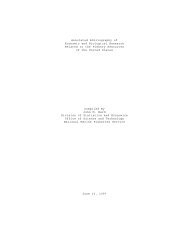NOAA Protocols for Fisheries Acoustics Surveys and Related ...
NOAA Protocols for Fisheries Acoustics Surveys and Related ...
NOAA Protocols for Fisheries Acoustics Surveys and Related ...
You also want an ePaper? Increase the reach of your titles
YUMPU automatically turns print PDFs into web optimized ePapers that Google loves.
26.3<br />
26.2<br />
26.1<br />
Winter<br />
Winter System Value<br />
Summer<br />
Summer System Value<br />
26.0<br />
25.9<br />
TSgain<br />
25.8<br />
25.7<br />
25.6<br />
25.5<br />
25.4<br />
25.3<br />
5-Mar-99 21-Sep-99 8-Apr-00 25-Oct-00 13-May-01 29-Nov-01 17-Jun-02 3-Jan-03<br />
Date<br />
Figure 1. Winter <strong>and</strong> summer TS gain measurements from calibration of the AFSC 38 kHz<br />
Simrad EK500 system.<br />
System Per<strong>for</strong>mance<br />
Further details about AFSC system per<strong>for</strong>mance checks can be found in the following<br />
operating manuals - MACE (2003a), Simrad (1997), <strong>and</strong> Simrad (2001).<br />
To ensure system stability, the following checks are conducted daily. A snapshot of system<br />
parameters is recorded to a file. With the transmitter disabled, the internal test oscillator<br />
amplitude is confirmed to be within specification. With the transmitter enabled <strong>and</strong> the aid of an<br />
oscilloscope, transmit current <strong>for</strong> each of the four transducer quadrants is checked <strong>for</strong> any<br />
significant change. Should a problem exist, these two checks can help isolate the offending<br />
component. If both the test tone <strong>and</strong> current are bad, it is most likely the transducer. If the test<br />
tone is bad <strong>and</strong> the current is good, it is most likely the receiver. If the test tone is good <strong>and</strong> the<br />
current is bad, it is most likely the transmitter (Dan Twohig, pers. comm.).<br />
85
















